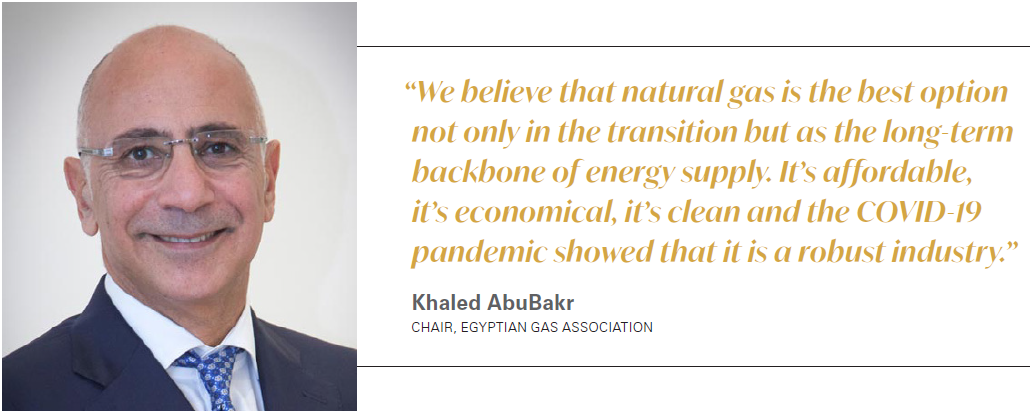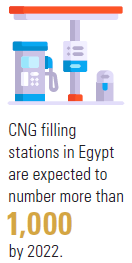Gas to remain Egypt’s backbone: EGA head [Gas in Transition]
Natural gas will "remain the backbone of Egypt's energy sector for decades to come," Egyptian Gas Association (EGA) chairman Khaled AbuBakr tells NGW, rejecting recent international calls for investment in oil and gas to end.
The last 20 years have seen a sea change in Egypt's energy mix. The North African state, which once relied heavily on fuel oil for its power, now generates 90% of its electricity from gas. The government envisages gas remaining the dominant fuel in the long term, even as the role of renewables increases.
"We've also seen a big shift in the efficiency of generating power from gas," AbuBakr said. "The government has replaced the old and inefficient simple cycle generation units with combined-cycle gas turbines. So the same amount of gas is giving us much more energy."
Underpinning this energy policy are the large gas reserves that have been discovered off Egypt's Mediterranean coast. The 2015 discovery of the super-sized Zohr field by Italy's Eni in 2015 was a turning point. The field was flowing gas within just over two years, and a number of other large-sized discoveries have been made since then. In late 2018, Egypt reclaimed the status of a net gas exporter.
An “unacceptable” conclusion
While Egypt and a number of other developing nations are scaling up the role of gas in their economies, many developed nations are taking steps to curtail new investment in gas supply in order to deliver on their climate goals. The International Energy Agency (IEA) said in a report in May that if the target of net-zero emissions by 2050 is to be reached, no more investment in oil and gas production is needed beyond existing projects.
Organisations representing gas suppliers including the Gas Exporting Countries' Forum and the International Gas Union have dismissed the report's recommendations as unrealistic and a risk to energy security if acted upon.
AbuBakr said he says he considers the IEA scenario as "unacceptable."
"It does not represent the voice of Africa," he tells NGW. “Africa suffered for decades and decades from poverty and dictatorship, but now it is emerging out of this darkness through economic development and progressive democracy. Now it is starting to develop its own gas resources to bring cleaner and more affordable energy to houses and industries. We cannot accept what the IEA is saying. Gas is much cleaner than any of the other fuels Africa is using now."
"We believe that natural gas is the best option not only in the transition but as the long-term backbone of energy supply," he continued. "It's affordable, it's economical, it's clean and the COVID-19 pandemic showed that it is a robust industry. Gas delivered energy to power stations, hospitals and homes, even when supplies of other commodities were disrupted."
"Until another energy industry proves it is as reliable, we will continue depending in this part of the world on the industry we trust in, natural gas," he said.
Export ambitions
Egyptian gas production averaged 6.6bn ft3/day (68.2bn m3) in 2020, according to its petroleum ministry, down 12.7% as a result of the pandemic, which caused the country's spot LNG sales to slump. Field activities continued during the year, however, yielding 62 new oil and gas discoveries, the ministry estimates. Another 22 contracts were also signed with international oil companies, which the ministry said were worth at least $1.2bn.
Egypt has implemented reforms in recent years to try and rope in more investment to its upstream sector. The government began phasing out price subsidies in 2014, incentivising supply while also making consumption more efficient. It also floated its currency in 2016 and approved a new investment law in 2017. Private companies are also set to gain the right to import, transport and distribute gas to the local market, rather than having to sell their supplies to the state.
“This will be a very healthy step for the market,” AbuBakr said.
 With a growing surplus of gas supply, Egypt has turned its attention to expanding LNG exports. A milestone came in February this year, when the Eni-run 5mn metric ton/year Damietta LNG plant was restarted after over an eight-year hiatus. The plant was closed in 2012 at a time when Egypt was struggling with domestic shortages, and its relaunch was delayed because of a dispute between its shareholders that was finally resolved in December 2020. Egypt has a second 7.2mn mt/yr LNG terminal in Idku.
With a growing surplus of gas supply, Egypt has turned its attention to expanding LNG exports. A milestone came in February this year, when the Eni-run 5mn metric ton/year Damietta LNG plant was restarted after over an eight-year hiatus. The plant was closed in 2012 at a time when Egypt was struggling with domestic shortages, and its relaunch was delayed because of a dispute between its shareholders that was finally resolved in December 2020. Egypt has a second 7.2mn mt/yr LNG terminal in Idku.
Egypt is also interested in transiting gas. It started taking gas at the start of last year from the giant Leviathan field off Israel. US major Chevron and its partners at Leviathan took a decision in January to invest around $230mn in a new pipeline to Egypt in order to expand supplies to 7bn m3/yr. This was followed by preliminary agreement between the Israeli and Egyptian governments the following month on linking Leviathan with Egypt's LNG terminals.
Egypt's LNG terminals are currently under-utilised, leaving room for transit volumes or new domestic supply coming on stream.
Places for gas at home
Beyond power generation, Egypt is keen to promote greater gas use in other sectors of its economy, from vehicle and maritime transport to petrochemicals and household cooking. The government wants to increase the number of natural gas vehicles (NGVs) on the road in order to reduce pollution in larger cities and cut transport costs. Compressed natural gas (CNG) has grown more competitive as a vehicle fuel in Egypt since IMF reforms introduced in 2014 made gasoline and diesel more expensive.
Egypt was one of the world’s biggest NGV markets in the early 1990s but it fell behind other countries in the ensuing years as the authorities did not provide the necessary incentives to encourage companies to convert their vehicles to CNG, AbuBakr said.
The government now subsidises the conversion cost, however. It wants to have 400,000 converted cars on the road by 2023. Some 38,000 were converted last year alone. The number of CNG filling stations is also projected to rise to 1,000 by 2022, from just over 300 currently.
AbuBakr is also executive chairman of energy group TAQA Arabia, which expects to have 50 CNG stations up and running by the end of the year and to reach 200 by the year 2023, up from 23 currently. The company is also involved in gas distribution and is creating virtual CNG pipelines to reach remote customers where there is no grid access, enabling them to switch from diesel.
TAQA is planning on using this solution to provide gas to the remote city of Kharga in the new valley governorate, some 300 km from the nearest pipeline. It is in the process of building a normal gas grid in the city to supply 14,000 customers, but this grid will receive mobile CNG rather than piped gas.
"This sets a precedent in Africa and the Middle East," AbuBakr said. "I think that model will be followed at other locations in Egypt and also in other areas Africa, especially in Nigeria, Tanzania and Mozambique."
Egypt has a number of major petrochemical projects in the pipeline that will use natural gas and its liquids as feedstock. But AbuBakr cautioned that many of these projects would need a low gas price to be feasible. Investors continue pricing talks with the government.
AbuBakr also sees strong potential for LNG bunkering in Egypt. The country's Suez Canal handles around 10-15% of global shipping trade, and there are calls to declare the Mediterranean an emissions control area, imposing stricter rules on fuel pollutants. This would likely encourage more shipowners in the region to switch to LNG.
|
Insight into Egypt with Anthony Skinner, director of MENA at Verisk Maplecroft Egypt has enjoyed significant success in the field of gas exploration in recent years, and there are a number of IOCs operating in the country. How might the government spur more investment in its upstream sector? Minister of Petroleum Tarek Al-Mulla has successfully attracted large scale upstream investment to Egypt. Official data shows that 84 contracts were signed between July 2014 and June 2020; over 100 international oil companies (IOC) have interests in Egypt. The market is saturated, meaning that the government is under little pressure to tweak upstream fiscal terms favourably for investors or provide other incentives to attract new interest. Interest is already there. One area that has been a bee in the bonnet of many upstream investors has been the government’s mixed track record over the last few years of servicing IOC arrears. Oil and gas companies with a large footprint in Egypt typically have their arrears paid faster than those with a smaller and/or less strategic presence. This can be a challenge for operators who do not have a large cushion to fall back on. Is it fair to say that gas supplies from Leviathan, by forging a key economic relationship between Israel and Egypt, can drive an improvement in political relations? It will play an important role, although the two countries have more than mutual energy interests in common. Israel is an essential security partner in the fight against Wilayat Sinai (WS) in North Sinai, while Egypt is an important broker between Israel and Hamas. Egypt has greater leverage over Hamas than other external actors in the region and uses its strong relationship with Israel as a bargaining chip in Washington. I am not suggesting that the energy plank of bilateral relations is insignificant. Far from it. Egypt’s strong position as a regional energy conduit and hub constitutes a key pillar in bilateral ties. Israel depends on Egypt’s liquefaction infrastructure to process its gas for export to Europe. Israel is also a key member of the eastern Mediterranean Gas Forum which is based in Cairo. Relations are complex, however. Strong Egyptian public support for the Palestinians – if anything strengthened by the recent round of blood-letting between Hamas and the IDF – has caused the Egyptian administration to take an outwardly tougher and more outspoken line against Israel. I don’t see this jeopardising the vital interests which bind the ruling elite of both countries together though. |



